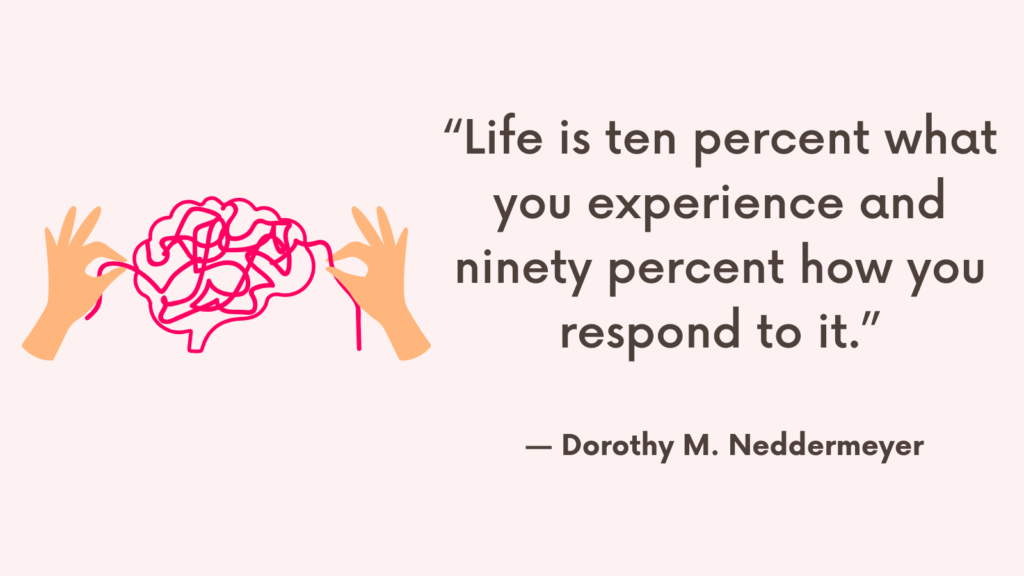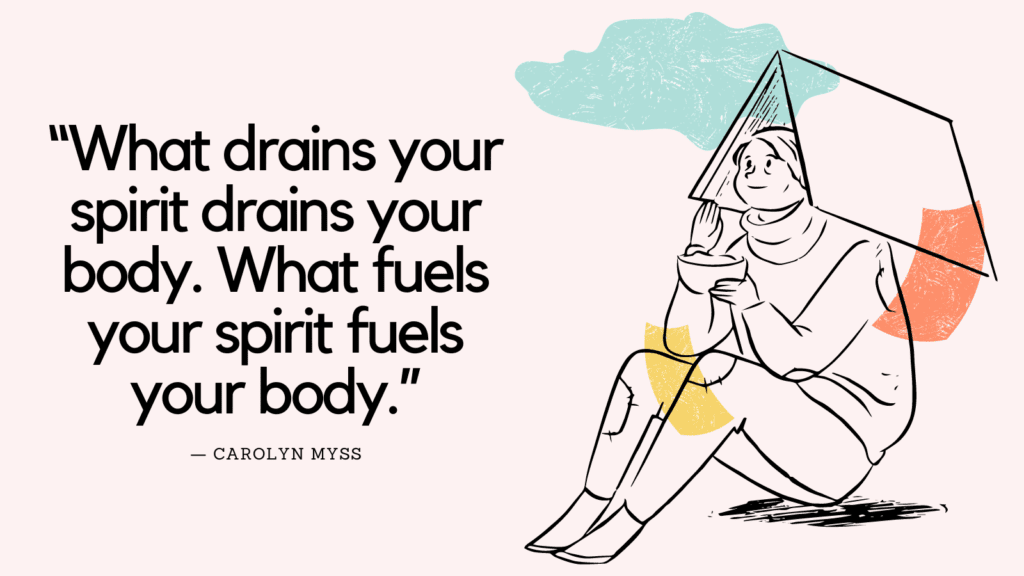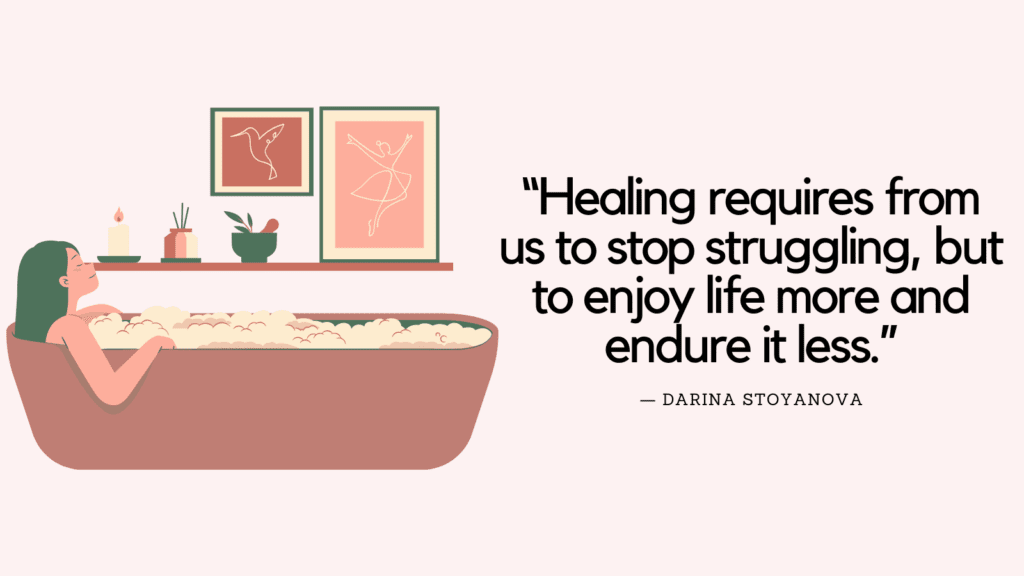This post contains journal prompts for depression that will help you manage your emotions in healthy ways and cope.
Disclosure: Some of the links below are affiliate links. This means that, at zero cost to you, I will earn an affiliate commission if you click through the link and finalize a purchase.
In the United States, depression is one of the most common mental health disorders among adults.
The National Institute of Mental Health (NIMH) says that 7.1% of all adults have had at least one significant depressive episode in their lifetime.
Formal Symptoms of Depression
The Diagnostic and Statistical Manual of Mental Disorders, Fifth Edition, Text Revision (DSM-5-TR) sets the following symptoms as diagnostic criteria for major depressive disorder:
Five (or more) of the following symptoms have been present during the same 2-week period and represent a change from previous functioning: at least one of the symptoms is either (1) depressed mood or (2) loss of interest or pleasure.
1. Depressed mood most of the day, nearly every day, as indicated by either subjective report (e.g., feels sad, empty, hopeless) or observation made by others (e.g., appears tearful).
2. Markedly diminished interest or pleasure in all, or almost all, activities most of the day, nearly every day.
3. Significant weight loss when not dieting or weight gain (e.g., a change of more than 5% of body weight in a month), or decrease or increase in appetite nearly every day.
4. Insomnia or hypersomnia nearly every day.
5. Psychomotor agitation or retardation nearly every day. (e.g., pacing around, talking rapidly, slowed speech, poor memory)
6. Fatigue or loss of energy nearly every day.
7. Feelings of worthlessness or excessive or inappropriate guilt (which may be delusional) nearly every day (not merely self-reproach or guilt about being sick).
8. Diminished ability to think or concentrate, or indecisiveness, nearly every day.
9. Recurrent thoughts of death (not just fear of dying), recurrent suicidal ideation without a specific plan, or a suicide attempt or a specific plan for committing suicide.
Related: Do I Have Seasonal Depression Quiz (+Top 12 Natural Ways To Boost Your Mood)
What Is Journaling?
Journaling is about pouring your feelings and thoughts on a paper so you can reflect on them and understand them better.
The clarity you gain from journaling will reduce the intensity of your pain and help you figure out what needs to be done about your depressive symptoms.
Studies have shown that journaling can:
Journal Prompts For Depression
If you need ideas to use journaling to manage your depression, the following journal prompts for depression will help you with that:
1. Check-in With Yourself
1. Where do you feel most depressed in your body?
2. What is something that made you feel sad today? Is there something or someone you’re grieving?
3. What is making you feel hopeless today and why?
4. What specific emotions do you feel, underneath this depression? Where in my body do you feel it? What do you want to feel there instead?
5. What are your negative thoughts at this moment? What are 3 positive thoughts for each of those negative thoughts you have?
Related: Top 10 Common Examples of Cognitive Distortions – How To Challenge Them (+Worksheets PDF)
6. What coping mechanisms did you practice today? (Or, what things did you do that made you feel better?)
2. Reflect
7. Looking back, were some early signs that you were heading toward depression?
8. What things or events activate or worsen your depression symptoms?
Related: What is Concealed Depression? (Effective 3-Step Guide To Overcome High Functioning Depression)
9. Describe your bedtime routine. Is it helpful or harmful for your sleep?
10. When you feel depressed, how do you typically respond?
11. If depression is a messenger, what is it trying to tell you in this moment? (If depression could talk, what would it say?)
12. If depression was an image, what would the image be?
13. What do you think about the statement: “depression is anger turned inward”?
14. If you were to give your depression a human name, what name would you choose and why?
15. Write an open letter to your depression. What would you say to it?
Related: Do I Have Seasonal Depression Quiz (+Top 12 Natural Ways To Boost Your Mood)
3. Make a Change
16. What are your goals for the day?
17. What challenges are you facing right now and need to ask for help and support with?
18. When in the past did you feel most alive, hopeful, and safe? What was happening then? What were you doing? Who was there for you?
19. What do you feel are consistent happiness activators in my life? (Things that always make you feel good)
20. What’s one thing you could do that will change your life now?
21. What do you need more of in your life? How could you take steps toward that?
22. What do you need less of in your life? How could you take steps toward that?
23. When did you show emotional resilience in the past? What helped you be resilient?
24. What is something you are looking forward to?
25. What is one thing you are curious to try but have not gotten around to it?
26. When was the last time you did something nice for yourself?
27. How can you better take care of yourself emotionally when you’re feeling depressed? What worked in the past?
28. What is one self-care practice you can add to your daily routine?
Related: Top 45 Self Care Day Ideas at Home To Kickstart Your Self Care Ritual
4. Boost Your Mood
29. What things made you happy today?
30. What are things you are grateful for today?
Related: How To Practice Gratitude When Depressed? (10 Practical Gratitude Exercises)
31. List all of today’s achievements, no matter how small.
32. What are your favorite qualities about yourself and why?
33. What are 3 examples of times you’ve shown strength and resilience?
34. What are 3 things that make you feel at peace?
35. Write about your happiest childhood memory.
36. What was the most beautiful compliment you ever received?
37. What are a few positive things going on in your life right now?
38. If you could have the same dream every night, what would you dream about and why?
39. What are the lessons from today that you want to remember tomorrow?
40. What advice would you give a dear friend about managing depression?
41. What are 10 things worth living for?
42. What would you do if you had more energy?
43. What would your life be like if you didn’t have depression?
44. If you could volunteer anywhere, where would you volunteer and why? How would volunteering help you feel better?
45. Write a love letter to yourself, saying all the comforting things you need to hear.
FREE Depression Worksheets
Tips for Journaling for Depression
- Schedule your journaling time: Commit to at least five minutes a day.
- Be consistent: Make journaling a daily habit.
- Start with 2-5 minutes meditation: This can help you re-center yourself and quite the chatter in your head.
- Use a Feeling List: This will help you better identify your emotions. You may use this free Bodily Sensations List (Download PDF) and Feelings List (Download PDF).
Depression Resources
HELPLINES
National Alliance on Mental Illness NAMI, the National Alliance on Mental Illness, is a mental health organization dedicated to building better lives for the millions of Americans affected by mental illness.
National Suicide Prevention Lifeline The National Suicide Prevention Lifeline is a 24-hour, toll-free.
DEPRESSION SCREENING
The Depression Screening website is sponsored by Mental Health America as part of the Campaign for America’s Mental Health. It will help you get screened for symptoms of depression and guide you toward appropriate professional help if necessary.
INFORMATION AND SUPPORT
Depression Resource Center Contains consumer-friendly definitions, answers to frequently asked questions, clinical resources, and expert videos about childhood depression.
Anxiety and Depression Association of America (ADAA) A nonprofit organization dedicated to the prevention, treatment, and cure of anxiety, depressive, obsessive-compulsive, and trauma-related disorders through education, practice, and research.
APPS
Depression CBT Self-Help Guide (Android), Sanvello: Anxiety & Depression (Android/iphone), MindDoc (Android/iphone), TalkLife: Depression & Anxiety (Android/iphone).
PODCASTS
Feeling Good Podcast by Dr. David Burns, an adjunct professor of psychiatry and behavioral sciences at the Stanford University School of Medicine
TED TALKS
Jake Tyler: “I’m Fine” – Learning To Live With Depression
Nikki Webber Allen: Don’t suffer from your depression in silence

Best Light Therapy Lamps
References
- Portions of this article were adapted from the book Diagnostic and Statistical Manual of Mental Disorders, Fifth Edition, Text Revision (DSM-5-TR), © 2013 by American Psychiatric Association. All rights reserved.
- Anxiety and Depression Association of America Facts & Statistics
- NIMH » Major Depression
- Emotional and physical health benefits of expressive writing | Advances in Psychiatric Treatment | Cambridge Core
- Online Positive Affect Journaling in the Improvement of Mental Distress and Well-Being in General Medical Patients With Elevated Anxiety Symptoms: A Preliminary Randomized Controlled Trial







